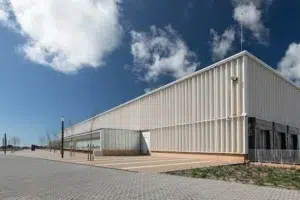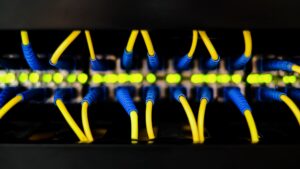Portugal’s Digital Infrastructure Revolution: Building Tomorrow’s Connected Nation
Portugal is experiencing an unprecedented transformation in digital infrastructure, positioning itself as a strategic hub for global connectivity and technological innovation. With billions of euros in investments flowing into data centers, submarine cables, 5G networks, and digital transformation initiatives, the country is rapidly becoming Europe’s gateway for digital services and a bridge between continents. The Portugal Tech Hub plays a crucial role in supporting this transformation by connecting businesses with the right technology solutions and expertise.

The Portuguese government’s commitment to digital infrastructure development, backed by EU funding and private sector investments, has created a perfect storm of opportunities. From the Atlantic coast to the inland regions, major projects are reshaping the nation’s technological landscape and establishing Portugal as a critical player in the global digital economy.
Start Campus: Europe’s Largest Sustainable Data Center Initiative
The Start Campus project in Sines represents one of Europe’s most ambitious data center developments, with a staggering €8.5 billion investment that has captured global attention. This privately funded initiative, backed by Davidson Kempner Capital Management and Pioneer Point Partners, is transforming Portugal’s digital infrastructure landscape with its 1.2-gigawatt (GW) capacity across six planned buildings.

In April 2025, Start Campus officially inaugurated its first facility, SIN01, marking a pivotal milestone in Portugal’s digital evolution. This 26MW data center facility has nearly doubled the country’s total data center capacity, establishing Portugal as a serious contender in the European data economy. The facility leverages innovative seawater cooling technology, achieving a remarkable design Power Usage Effectiveness (PUE) of 1.1 without consuming any water resources.
Robert Dunn, CEO of Start Campus, emphasizes the project’s significance: “From the edge of the Atlantic, we are building the backbone of Europe’s AI future.” The campus has already secured over 1GW of grid power, making it one of the largest colocation sites in Europe with fully secured electrical capacity. Construction of the second 180MW facility (SIN02) is expected to begin later in 2025, with the remaining buildings scheduled for completion over the next five years.
The strategic location in Sines offers exceptional subsea and terrestrial connectivity, delivering competitive latencies to all major European and global economic centers. Major technology partners, including Schneider Electric, have collaborated to ensure the facility operates entirely on renewable energy, reinforcing Portugal’s commitment to sustainable digital growth. This positions Sines alongside Lisbon tech hub and Porto tech ecosystem as key nodes in Portugal’s digital infrastructure network.
Atlantic CAM Ring: Connecting Portugal’s Islands with Next-Generation Technology
Portugal’s ambitious Atlantic CAM (Continente-Açores-Madeira) submarine cable project represents a crucial infrastructure upgrade that will revolutionize connectivity between mainland Portugal and its autonomous regions. This €154.4 million investment, awarded to Alcatel Submarine Networks (ASN) in March 2024, will span 3,812 kilometers with six fiber pairs offering a total capacity of 150 terabytes per second (Tbps).

The new system, scheduled for completion by the end of 2026, will replace the aging CAM Ring infrastructure that has reached the end of its operational life. This represents a 500-fold increase in transmission capacity compared to the current system, ensuring ultra-high-speed, low-latency connectivity essential for 5G mobile technologies and future digital services.
What sets the Atlantic CAM apart is its integration of SMART (Science Monitoring And Reliable Telecommunications) technology. This innovative feature includes approximately 50 sensors placed along the cable route, enabling real-time seismic detection, climate monitoring, and environmental data collection. Portugal becomes one of the first countries to implement this dual-purpose infrastructure, combining telecommunications with scientific research capabilities.
The project addresses critical connectivity needs for the Azores and Madeira, where reliable high-speed internet is essential for economic development and social inclusion. IP Telecom, a subsidiary of Infraestruturas de Portugal, will operate the system as a wholesale provider, ensuring competitive pricing that promises to reduce costs by more than 50% compared to current rates.
5G Network Expansion: Achieving Near-Universal Coverage
Portugal’s 5G deployment has accelerated dramatically throughout 2024 and into 2025, with coverage now reaching 98% of households nationwide. This remarkable achievement positions Portugal among the European leaders in 5G infrastructure, with rural areas also benefiting from extensive coverage at approximately 87.5%. The widespread 5G network Portugal deployment is enabling new business opportunities across various sectors.

The three major operators – NOS, MEO (Altice Portugal), and Vodafone Portugal – have invested heavily in network expansion following the 2021 spectrum auction that raised nearly €567 million. NOS has emerged as a frontrunner, launching Portugal’s first 5G Standalone network in May 2025 with over 4,200 base stations covering 93% of the population. The operator has invested €420 million in its 5G infrastructure, with plans for an additional €110 million investment in the coming years.
MEO and Vodafone have similarly expanded their networks, creating a competitive environment that benefits consumers and businesses alike. The widespread availability of 5G technology is enabling new applications in areas such as smart cities, autonomous vehicles, industrial automation, and enhanced mobile broadband services. This technological advancement complements Portugal’s growing startup ecosystem and attracts innovative companies looking to leverage cutting-edge connectivity.
The Portuguese government’s National Strategy for Connectivity aims to ensure 100% 5G coverage by 2026, supported by both private investments and public funding where market failures might lead to exclusion. This comprehensive approach ensures that even remote and rural communities have access to cutting-edge connectivity.
National Digital Strategy 2025-2026: A Comprehensive Transformation Plan
In December 2024, Portugal approved its National Digital Strategy, establishing a clear vision for digital transformation through 2030. The immediate action plan for 2025-2026 involves a €350 million investment across 49 actions grouped into 16 strategic initiatives.
Key objectives of the strategy include achieving 80% digital literacy among the Portuguese population and ensuring 90% of small and medium enterprises (SMEs) reach a basic level of digitalization by 2030. The plan focuses on three main pillars: capacity building and digital inclusion, business digital transformation, and public services digitalization. Portuguese tech companies are playing a vital role in implementing these initiatives.
Notable initiatives launching in 2025 include a pilot project in 10 municipalities to teach robotics, programming, and artificial intelligence to young people during school holidays. The strategy also emphasizes cybersecurity enhancement in public administration, with the creation of a technical support pool for incident response.
The government is establishing a collaborative digital hub that will bring together public administration, businesses, higher education institutions, and research centers to develop and test innovative solutions. This ecosystem approach ensures that digital transformation benefits all sectors of society while maintaining Portugal’s competitive edge in the global digital economy. Companies seeking cloud computing Portugal solutions will find an increasingly sophisticated infrastructure to support their needs.
Submarine Cable Infrastructure: Portugal as a Global Connectivity Hub
Portugal’s strategic Atlantic location has transformed it into a crucial hub for international submarine cables, with approximately 25% of global submarine fiber optic cables landing on Portuguese shores. This unique position is attracting major technology companies and telecommunications providers to establish Portugal as their European gateway.

Beyond the Atlantic CAM project, several other significant submarine cable initiatives are strengthening Portugal’s position. The 2Africa cable system, funded by Meta and spanning 45,000 kilometers, landed in Carcavelos in 2024, becoming the most comprehensive subsea cable system ever deployed. The Medusa cable, a €326 million project connecting Portugal to Mediterranean countries, is scheduled for service in 2024-2025.
Google’s upcoming “Nuvem” (Cloud) cable will create the first direct connection between the United States and the Azores, with a landing point in Sines. This 6,900-kilometer cable promises an impressive capacity of 24 Tbps per fiber pair, significantly enhancing transatlantic data transmission capabilities.
These submarine cable projects complement the Start Campus data center development, creating a synergistic ecosystem that positions Portugal as an ideal location for companies requiring low-latency connections to multiple continents. The combination of robust submarine infrastructure and state-of-the-art data centers makes Portugal increasingly attractive for cloud computing, content delivery, and AI applications. Organizations looking for reliable internet service provider Portugal options benefit from this enhanced connectivity.
Digital Transformation in Public Services and e-Government
Portugal’s modernization efforts extend beyond physical infrastructure to encompass comprehensive digital transformation of public services. The government has implemented ambitious programs to digitalize administrative processes, reduce bureaucracy, and improve citizen services through technology.

The Agency for Integration, Migration, and Asylum (AIMA) exemplifies this transformation with its robust plan to eliminate residency application backlogs by implementing integrated digital platforms. These systems consolidate various public services into unified interfaces, significantly reducing processing times and improving user experience.
The Multibanco (MB) system continues to evolve as a cornerstone of Portugal’s digital financial infrastructure, connecting all major banks through a single network and enabling seamless digital transactions. This system has become a model for integrated banking services, facilitating everything from bill payments to government service fees through a unified platform.

Educational initiatives form another crucial component, with programs designed to improve digital skills across all age groups. The government’s focus on computational thinking and digital literacy ensures that current and future generations are prepared to participate fully in the digital economy.
Fiber Optic Network: Leading Europe in Connectivity
Portugal’s fiber optic infrastructure stands as one of Europe’s most extensive, with coverage reaching 92% of households – well above the EU average. This achievement results from sustained public and private investments in broadband infrastructure, positioning Portugal among the top countries globally for fiber penetration.

The comprehensive fiber network provides the backbone for all other digital services, from 5G backhaul to data center connectivity. Rural areas have particularly benefited, with 70% of rural households now having access to fiber optic broadband, ensuring digital inclusion across the entire territory.
This robust infrastructure supports Portugal’s ambitions in areas such as remote work, digital nomadism, and technology-based industries. The combination of widespread fiber coverage and competitive pricing has made Portugal an attractive destination for digital professionals and technology companies seeking reliable, high-speed connectivity.
Investment and Economic Impact
The scale of digital infrastructure investments in Portugal is reshaping the national economy. The combined investments in data centers, submarine cables, 5G networks, and digital transformation initiatives exceed €10 billion, representing one of the largest infrastructure modernization programs in the country’s history.

The Start Campus project alone is expected to create up to 1,200 direct highly skilled jobs and 8,000 indirect jobs by 2028. The construction phase of SIN01 involved over 2 million labor hours, demonstrating the immediate economic impact of these projects on local employment and supplier networks.
Portugal’s Recovery and Resilience Plan (RRP), supported by EU funding, allocates 22% of its total budget to digital transformation, exceeding the 20% threshold required by European regulations. This funding, combined with private sector investments, ensures sustainable financing for ongoing and future digital infrastructure projects.
The economic benefits extend beyond direct employment. Enhanced digital infrastructure attracts international businesses, supports the growth of local technology companies, and enables new business models in sectors ranging from fintech to digital health. Portugal’s emergence as a data center hub is particularly significant, with studies suggesting that data centers could contribute up to €26 billion to the national GDP between 2025 and 2030.
Environmental Sustainability and Green Technology
Sustainability stands at the forefront of Portugal’s digital infrastructure development. The country’s commitment to renewable energy, with 87.4% of electricity generation coming from renewable sources in 2024, provides a solid foundation for sustainable digital growth.
The Start Campus project exemplifies this commitment with its innovative seawater cooling system and 100% renewable energy operation. This approach not only reduces environmental impact but also provides a competitive advantage in attracting environmentally conscious technology companies.

Portugal’s broader sustainability initiatives include the development of a sovereign cloud infrastructure to ensure data security while maintaining energy efficiency. The integration of digital infrastructure with renewable energy projects, such as offshore wind farms and solar installations, creates synergies that benefit both sectors.
Future Outlook and Emerging Opportunities
As Portugal advances its digital infrastructure agenda, several emerging opportunities are shaping the future landscape. The convergence of AI, edge computing, and 5G technologies creates new possibilities for innovation across industries.
The establishment of Portugal as an “Atlantic Hub” for submarine cables opens doors for becoming a major player in global data routing and processing. Combined with the Start Campus development and other data center projects, Portugal is well-positioned to serve as Europe’s gateway for AI and cloud computing services.
The government’s focus on digital skills development ensures that the workforce can leverage these infrastructure investments effectively. Initiatives in areas such as quantum computing research, blockchain applications, and IoT deployment signal Portugal’s ambition to remain at the forefront of technological innovation.
Looking ahead to 2030, Portugal’s digital infrastructure projects lay the foundation for a transformed economy. The combination of world-class connectivity, sustainable data centers, comprehensive 5G coverage, and digital public services creates an ecosystem that supports innovation, attracts investment, and improves quality of life for all citizens.

Portugal’s digital infrastructure projects in 2025 represent a transformative moment in the nation’s development. From the groundbreaking Start Campus data center to the revolutionary Atlantic CAM submarine cable system, these initiatives are positioning Portugal as a global leader in digital connectivity and innovation. The comprehensive approach, combining public policy support with private sector investment, ensures that Portugal will continue to play a crucial role in Europe’s digital future while creating opportunities for economic growth and social development.
